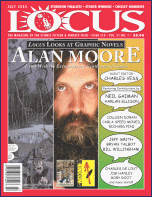 |

|
In League with Alan Moore |
July 2003 |
|
Alan Moore began his career as a cartoonist in 1979, but by the early '80s was best known as a writer. With artist Dave Gibbons he produced the 12-issue superhero story Watchmen, the first comic book to win a Hugo Award. (It also won a Locus Award.)
Moore created his own imprint, America's Best Comics (ABC), in 1999, and is writing several titles including The League of Extraordinary Gentlemen, which has been adapted as a major motion picture to be released this summer.
He lives in Northampton, England. He plans to "retire" this year on his 50th birthday, when he will end his work on ABC comics (except for The League of Extraordinary Gentlemen), and hopes to work on performance art and novels.
|
|

Alan Moore Fan Site
|
Excerpts from the interview (conducted by Mark Askwith):
“[C]omics, or something very much like the comic strip (by which I mean a sequential progression of images that tell a story, or convey some meaning), would seem to be about the earliest form of written language. If you are talking about Egyptian hieroglyphics, or the ancient Chinese pictograms, it seems to me the impulse to convey meaning or information in a sequence of pictures is probably our earliest impulse. You could take this back much further than hieroglyphics or ancient Chinese pictograms -- just take a look at the cave walls of Lascaux, which have kind of primitive comic strips decorating them, a progression of images. It would seem to me the comic-strip form, being one of the earliest forms of written communication, must be something we as a species find ourselves drawn to quite naturally.
“The fact that the comic strip, or something like it, tends to survive throughout mankind's history is also a testament to its staying power. As to why the comic strip should have this power, I suppose I'd have to say that it may be, and I stress this is only speculation, that the comic strip is one of the few art forms that engages both halves of the brain and sets them to the same task. This might account for the ability of the medium not only to transmit information, but to do so in a form that can be completely retained and remembered. There seems to be in comic strips a very primal form of technology at work, a profoundly powerful technology that we have yet to scratch the surface of.”
*

“I've no objection to the term 'graphic novel,' as long as what it is talking about is actually some sort of graphic work that could conceivably be described as a novel. My main objection to the term is that usually it means a collection of six issues of Spider-Man, or something that does not have the structure or any of the qualities of a novel, but is perhaps roughly the same size.
“When the opportunity arose to do things that were longer than a two- or three-issue run of a 24-page comic, it was just a case of imagining the structures. With Watchmen, a 12-issue miniseries seemed to be a fairly popular length. Dave Gibbons and I were able to work out a story that fit comfortably into that 12-issue length. Admittedly, that was probably the first time I'd attempted anything like that, so I probably misjudged the amount of plot that would fill 12 issues. I probably got six issues of plot when I started Watchmen. When I realized that, at the end of the first issue, we solved the problem by interspersing the more plot-driven issues with issues that gave kind of a biographical portrait of one of the main characters.”
The full interview, with biographical profile, is published in the July 2003 issue of Locus Magazine.
You may purchase this issue for $7.95 by sending a check to Locus, PO Box 13305, Oakland CA 94661; or for $10 via credit card submitted by mail, e-mail, or phone at (510) 339-9198. (Or, Subscribe.)
|
 |

